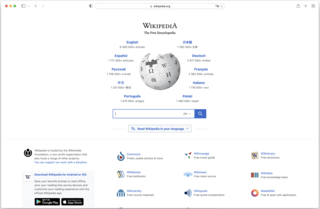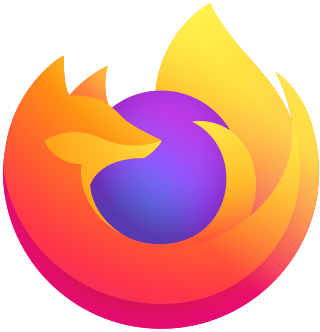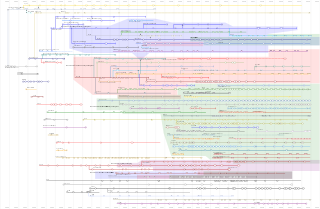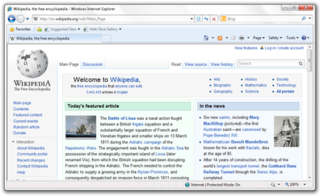
A web browser is an application for accessing websites and the Internet. When a user requests a web page from a particular website, the browser retrieves its files from a web server and then displays the page on the user's screen. Browsers are used on a range of devices, including desktops, laptops, tablets, and smartphones. In 2020, an estimated 4.9 billion people have used a browser. The most used browser is Google Chrome, with a 65% global market share on all devices, followed by Safari with 18%.

Mozilla Firefox, or simply Firefox, is a free and open-source web browser developed by the Mozilla Foundation and its subsidiary, the Mozilla Corporation. It uses the Gecko rendering engine to display web pages, which implements current and anticipated web standards. In November 2017, Firefox began incorporating new technology under the code name "Quantum" to promote parallelism and a more intuitive user interface. Firefox is available for Windows 10 or later versions, macOS, and Linux. Its unofficial ports are available for various Unix and Unix-like operating systems, including FreeBSD, OpenBSD, NetBSD, illumos, and Solaris Unix. It is also available for Android and iOS. However, as with all other iOS web browsers, the iOS version uses the WebKit layout engine instead of Gecko due to platform requirements. An optimized version is also available on the Amazon Fire TV as one of the two main browsers available with Amazon's Silk Browser.

Alexa Internet, Inc. was an American web traffic analysis company based in San Francisco. It was a wholly-owned subsidiary of Amazon.

A browser war is a competition for dominance in the usage share of web browsers. The "first browser war," (1995–2001) pitted Microsoft's Internet Explorer against Netscape's Navigator. Browser wars continued with the decline of Internet Explorer's market share and the popularity of other browsers including Firefox, Google Chrome, Safari, Microsoft Edge and Opera.
This is a comparison of both historical and current web browsers based on developer, engine, platform(s), releases, license, and cost.
Mozilla Firefox has features that allow it to be distinguished from other web browsers, such as Chrome and Internet Explorer.
Google Pack was a collection of software tools offered by Google to download in a single archive. It was announced at the 2006 Consumer Electronics Show, on January 6. Google Pack was only available for Windows XP, Windows Vista, and Windows 7.
NoScript is a free and open-source extension for Firefox- and Chromium-based web browsers, written and maintained by Giorgio Maone, an Italian software developer and member of the Mozilla Security Group.
A browser toolbar is a toolbar that resides within a browser's window. All major web browsers provide support to browser toolbar development as a way to extend the browser's GUI and functionality. Browser toolbars are considered to be a particular kind of browser extensions that present a toolbar. Browser toolbars are specific to each browser, which means that a toolbar working on a browser does not work on another one. All browser toolbars must be installed in the corresponding browser before they can be used and require updates when new versions are released.

Windows Internet Explorer 8 (IE8) is the eighth and, by now, discontinued version of the Internet Explorer web browser for Windows. It was released by Microsoft on March 19, 2009, as the successor to Internet Explorer 7. It was the default browser in Windows 7 and Windows Server 2008 R2.

Yahoo! Toolbar is a browser plugin. It is available for Internet Explorer, Firefox and Google Chrome browsers.

WOT Services is the developer of MyWOT, an online reputation and Internet safety service which shows indicators of trust about existing websites. The confidence level is based both on user ratings and on third-party malware, phishing, scam and spam blacklists. The service also provides crowdsourced reviews, about to what extent websites are trustworthy, and respect user privacy, vendor reliability and child safety.

Mozilla Firefox 4 is a version of the Firefox web browser, released on March 22, 2011. The first beta was made available on July 6, 2010; Release Candidate 2 was released on March 18, 2011. It was codenamed Tumucumaque, and was Firefox's last large release cycle. The Mozilla team planned smaller and quicker releases following other browser vendors. The primary goals for this version included improvements in performance, standards support, and user interface.

Google Chrome is a cross-platform web browser developed by Google. It was first released in 2008 for Microsoft Windows, built with free software components from Apple WebKit and Mozilla Firefox. Versions were later released for Linux, macOS, iOS, and also for Android, where it is the default browser. The browser is also the main component of ChromeOS, where it serves as the platform for web applications.

Private browsing is a privacy feature in some web browsers. When operating in such a mode, the browser creates a temporary session that is isolated from the browser's main session and user data. Browsing history is not saved, and local data associated with the session, such as Cookies, Web cache, are cleared when the session is closed. These modes are designed primarily to prevent data and history associated with a particular browsing session from persisting on the device, or being discovered by another user of the same device.
The W3C Geolocation API is an effort by the World Wide Web Consortium (W3C) to standardize an interface to retrieve the geographical location information for a client-side device. It defines a set of objects, ECMAScript standard compliant, that executing in the client application give the client's device location through the consulting of Location Information Servers, which are transparent for the application programming interface (API). The most common sources of location information are IP address, Wi-Fi and Bluetooth MAC address, radio-frequency identification (RFID), Wi-Fi connection location, or device Global Positioning System (GPS) and GSM/CDMA cell IDs. The location is returned with a given accuracy depending on the best location information source available.
Google Sidewiki was a web annotation tool from Google, launched in September 2009 and discontinued in December 2011. Sidewiki was a browser extension that allowed anyone logged into a Google Account to make and view comments about a given website in a sidebar. Despite the name, the tool was not a collaborative wiki, though the comments were editable by the author.
Browser security is the application of Internet security to web browsers in order to protect networked data and computer systems from breaches of privacy or malware. Security exploits of browsers often use JavaScript, sometimes with cross-site scripting (XSS) with a secondary payload using Adobe Flash. Security exploits can also take advantage of vulnerabilities that are commonly exploited in all browsers.

Torch was a Chromium-based web browser and Internet suite developed by the North Carolina–based Torch Media. As of November 2022, downloads for Torch are no longer available, and upon clicking the download button, users are redirected to the Torch Search extension on the Chrome Web Store.

Cốc Cốc browser is a freeware web browser focused on the Vietnamese market, developed by Vietnamese company Cốc Cốc and based on Chromium open source code. Cốc Cốc is available for Windows, Windows Phone, Android, and macOS operating systems and supports both English and Vietnamese. Cốc Cốc also has its own search engine service.











